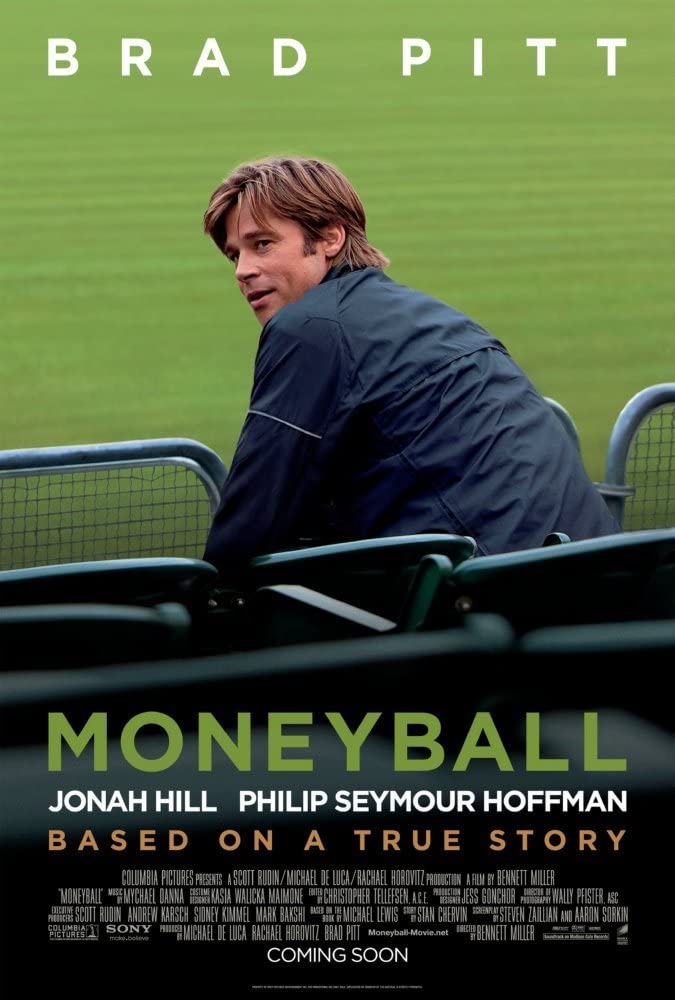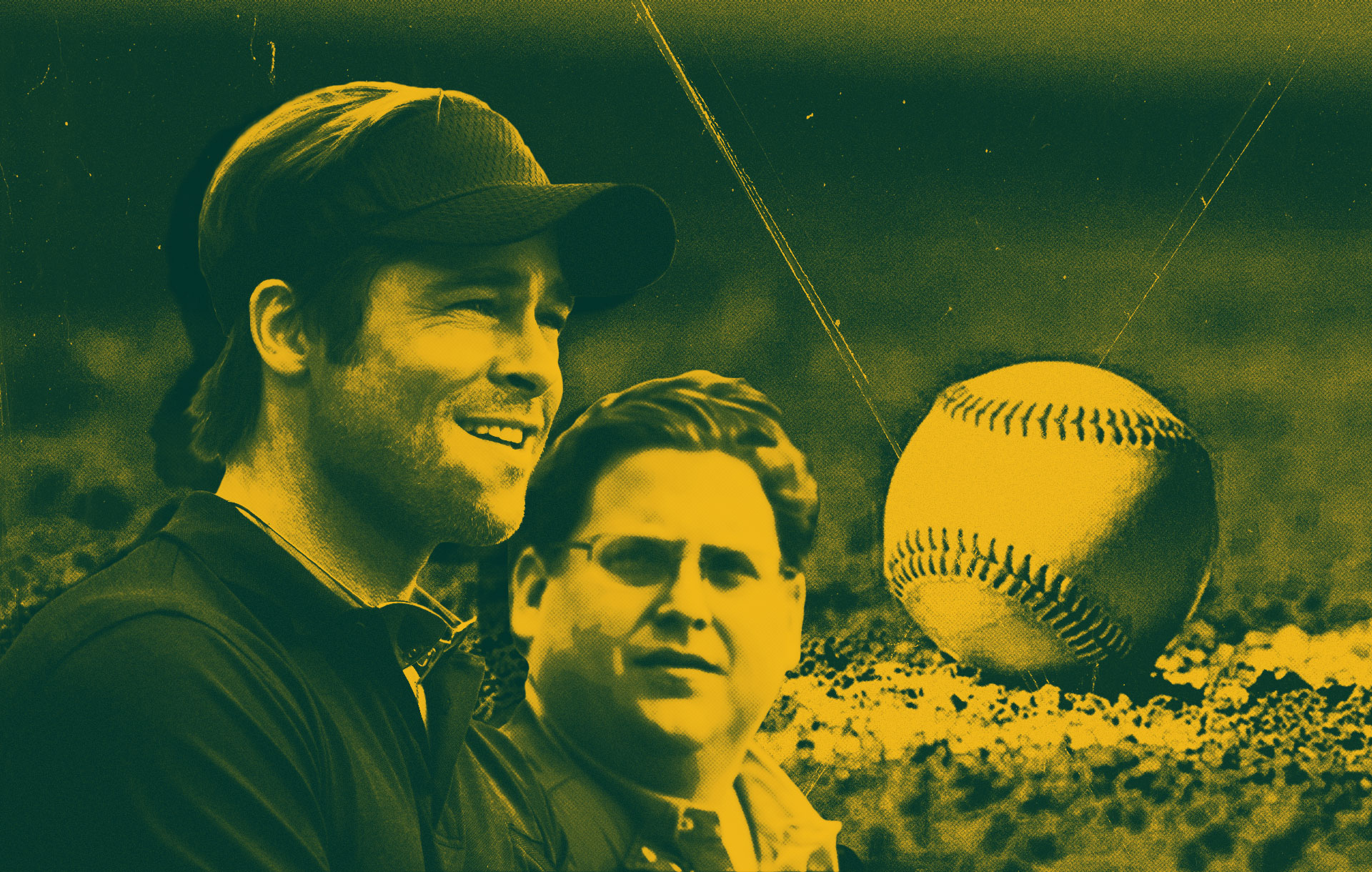The movie adaptation of Michael Lewis’ bestselling book Moneyball, the production of which had many fits and starts over the years, finally reached screens in September of 2011, ten years ago this week. The book, published in 2003, had told the story of how Oakland Athletics general manager Billy Beane built a winning team while having much less money available to him than such rivals like the Yankees and Red Sox.

The book kicked off a huge sea change in the game of baseball, encouraging the use of something that goes by many names- sabermetrics, analytics, “advanced stats,” and others. Essentially, Beane beat his opponents in part by outsmarting them, paying attention to stats that made certain players undervalued.
Moneyball represented a triumph of the nerds over the jocks
But beyond that, Moneyball represented a triumph of the nerds over the jocks, the smart guys over the clubhouse redasses. Not only did Moneyball inspire virtually every other team in baseball to start using similar methods, but it also kicked off a revolution in fandom: A new coterie of blogs, led by Fire Joe Morgan, soon emerged to apply a similar check on the often inane sports journalism done by the old guard. Many of the people who ran those blogs ended up as sportswriters themselves, or in team front offices or, in the cases of FJM’s Mike Schur and Alan Yang, creating acclaimed TV shows.
A key part of the cementing of Moneyball‘s legacy was the arrival of the movie in 2011. It was a landmark ― the first-ever baseball movie in which the hero was a team executive.
A Landmark Baseball Film
Starring Brad Pitt as Beane, directed by Bennett Miller, and written by the Oscar-winning duo of Steven Zaillian and Aaron Sorkin, the film hewed to the book fairly closely, following the events of the 2002 A’s season.
Pitt, despite being one of the world’s most handsome movie stars, was believable as the stat nerd-oriented Beane. Chris Pratt, years before Guardians of the Galaxy, played catcher-turned first baseman Scott Hatteberg.
Beane, along with right-hand man Peter Brand (Jonah Hill) adopts a new strategy, inspired by outsider baseball author Bill James, to emphasize on-base percentage and other stats and sign players under-appreciated by other teams. The strategy draws resistance from the team’s scouts and manager Art Howe (played by Philip Seymour Hoffman in one of his last roles), but Beane is later vindicated when the team fires off a 20-game winning streak and wins the division.
The film, like the book and real life, ends with the A’s losing in the 2002 playoffs to the Minnesota Twins, the Boston Red Sox trying to hire Beane away, and then, after being turned down, adopting aspects of Beane’s system and ending their 86-year championship drought in 2004.
The Moneyball movie also found a new and unique way to show baseball games on screen, with an unusually dark color palette. Even that last game against Minnesota is played at night in the movie when as a Twins fan, I remember that game ― the Twins’ last playoff series victory to date ― as a day game. And the script, despite being credited in part to Sorkin, was surprisingly un-Sorkin-like, with few of the writer’s signature trademarks.
Of course, certain things have happened in the years since that have cast a bit of doubt on the Moneyball project. For one thing, the Oakland A’s continue to be run by Billy Beane, and they haven’t won a thing, ever, for going in 25 years. One could attribute the team’s lack of success to Beane agreeing, in 2002 and 2003, to give away all of his secrets, first for a New York Times magazine profile and later for a bestselling book, just leaving them there for all of the other teams in baseball to steal. And that included the clubs with a lot more money to spend than the A’s.
One of those teams was the Houston Astros, who won the 2017 World Series after tanking, spending little, and using cutting-edge strategies.
They even inspired a book, called Astroball, which in Lewis-like fashion depicted the people behind that title-winning team as visionary geniuses. And then, of course, it turned out the Astros had cheated extensively during their championship season, with several of the individuals specifically lauded in the book ― especially general manager Jeff Luhnow and veteran player Carlos Beltran ― implicated heavily. The author of that book, Ben Reiter, later hosted a podcast to explore how he not only tied his personal and professional identity with that team but managed to miss such a major story with his years of close access.
Reconsidering Its Legacy
Then again, some attuned to the labor-related aspects of baseball have noticed something else: What is the Moneyball strategy, but a plot by management to pay employees as little as possible, in such a way that makes the executive doing it look like a genius when he wins anyway? There’s a reason the ideas of Moneyball gained widespread purchase in the business world.
It was less the case in 2002, but these days, owning a major league sports team essentially requires the owner to be a billionaire, and in that case, it’s not a matter of the owner not being able to afford better players, but rather choosing not to acquire them. And this year, a half-dozen teams in Major League Baseball are embracing the not-spending side of the Moneyball phenomenon, but leaving out the parts about “visionary player talent evaluation” and “trying to win.”
Yes, Moneyball is still a fine film, one that was very much deserving of its six Oscar nominations, including Best Picture and acting honors for both Pitt and Hill. But it’s clearer than ever now that the story a lot of us told ourselves about what was going on during the Moneyball era wasn’t quite the whole story.
Moneyball is streaming on Peacock.




